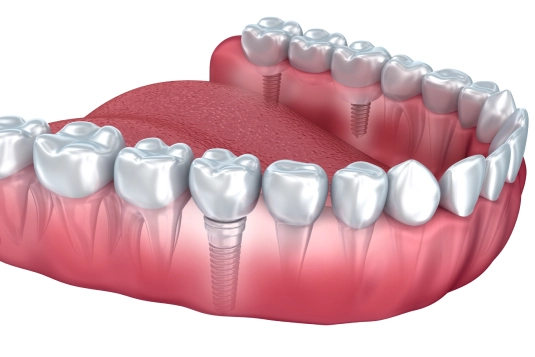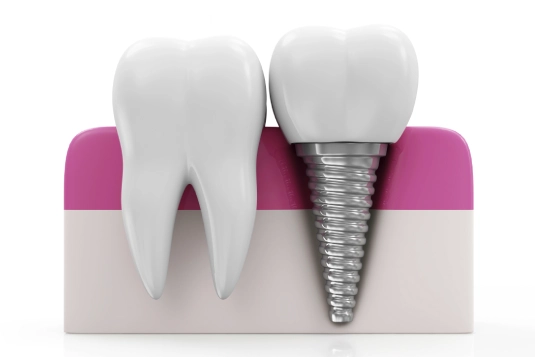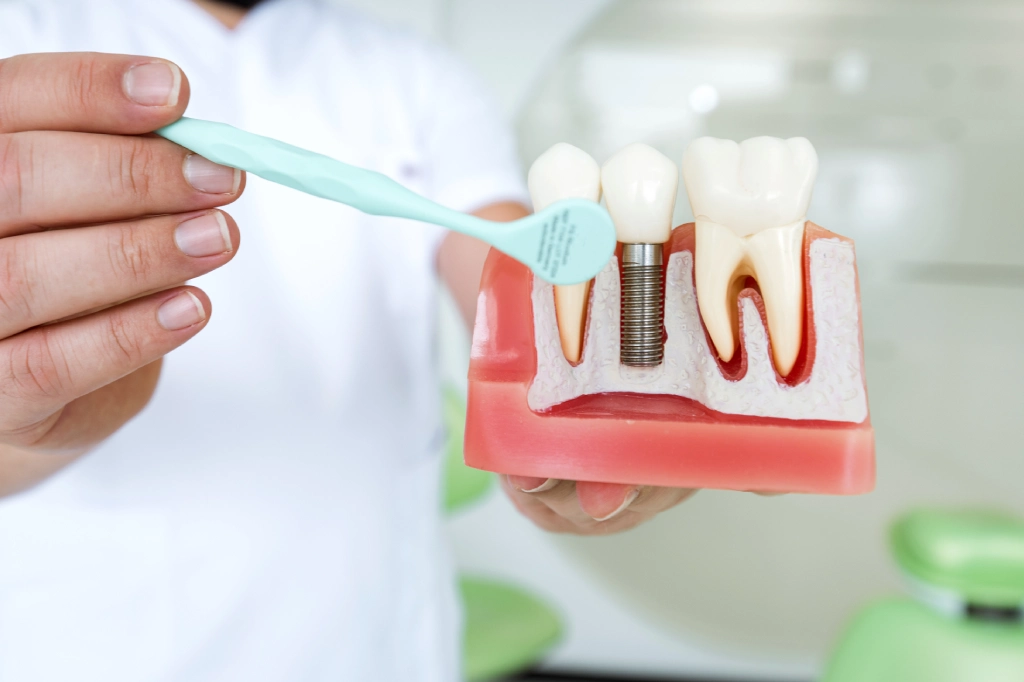Many people ponder the question, “How Long Do Dental Implants Last?” when considering a permanent fix for missing teeth. Dental implants have become a popular choice, but knowing how long they endure is essential. In this blog, we’ll take a closer look at the lifespan of dental implants, discussing what factors contribute to their longevity and addressing common questions about their durability.
In this blog, we delve into the question, “How Long Do Dental Implants Last?” to provide you with the insights you need to navigate the world of dental restoration confidently.
What are Dental Implants?
Dental implants are like artificial tooth roots, but they have a unique quality – they actually fuse with your jawbone. This strong bond makes them the most reliable option for replacing missing teeth. The implant itself is a small post, usually made of titanium or ceramic, which serves as a base for attaching dental crowns. Once the implant is in place, it becomes a part of your jawbone.
Then, there’s the abutment that connects the implant to the dental crown. Eventually, the dental crown is placed onto the abutment. Our team takes great care to make sure the crown fits perfectly and looks natural alongside your other teeth.

What factors affect how long dental implants last?
Several factors influence the longevity of dental implants:
Oral Hygiene
Good oral hygiene must be maintained for the long-term success of dental implants. Regular brushing, flossing, and dental check-ups help prevent gum disease and implant complications.
Overall Health
General health conditions such as diabetes and autoimmune disorders affect the healing process after implant surgery and increase the risk of implant failure.
Bone Quality and Quantity
Good bone density and volume are necessary to support dental implants. Patients with inadequate bone may require bone grafting procedures to strengthen the jawbone before implant placement.
Implant Placement
The precise positioning of dental implants by a skilled dentist or oral surgeon plays a significant role in their long-term stability and success.
Smoking
Tobacco use can impair healing and increase the risk of implant failure. Smokers are advised to quit or reduce smoking to increase the chances of successful implant integration.
Implant Design and Material
The type of implant and its composition (usually titanium or ceramic) can influence longevity. High-quality implants with advanced designs tend to have better durability.
Proper Care and Maintenance
Following post-implant surgery instructions and adhering to a regular dental care routine are essential for the ongoing health of dental implants.
Dental Occlusion
A balanced bite and proper distribution of forces during chewing help prevent excessive stress on dental implants, reducing the risk of complications.
Implant Maintenance
Routine dental appointments for cleanings and check-ups enable dentists to keep a close eye on the health of dental implants, promptly addressing any concerns that may arise.
How can Dental Implants last longer?
To ensure your dental implants or implant dentures stand the test of time, consider these straightforward strategies:

Keep Up with Dental Check-ups:
Regularly visit the dentist for dental check-ups and cleanings. This helps catch any issues with your implants early on and keeps your oral health in check.
Practice Good Oral Hygiene:
Brush and floss your teeth diligently, including around your implants. Opt for gentle toothpaste and soft-bristled brushes to protect your implants and gums from damage.
Use a Nightguard:
If you grind your teeth while sleeping, use a nightguard to ease the strain on your dental implants and keep them strong and intact.
Protect Your Mouth During Sports:
Wear a mouthguard to shield your implants from potential injuries while participating in sports.
Maintain a Healthy Lifestyle:
Eating well, staying active, and avoiding tobacco products promote healing and reduce any implant complications.
Avoid Harmful Habits:
Refrain from biting your nails, chewing hard candies, or using your teeth to open packages to prevent unnecessary strain on your implants.
When you take good care of them by brushing, flossing, and visiting the dentist regularly, dental implants can last a lifetime. However, the crown usually needs a replacement every 10 to 15 years because of normal wear and tear. With excellent dental care, though, it’s possible to extend the lifespan of the crown beyond 15 years.
What are Mini Dental Implants, and how long do they last?
Mini dental implants provide a less invasive option compared to traditional implants, using smaller metal posts during the procedure. However, because of their smaller size and limited treatment scope, mini dental implants may not be as durable and long-lasting as traditional ones.
Similar to regular implants, there are steps you can take to increase the lifespan of your mini dental implants. Your dental care habits significantly influence the long-term success of any dental restoration.
Conclusion
The longevity of dental implants is a topic of great interest for those considering this innovative solution for tooth replacement. With proper care and maintenance, they can last a lifetime, providing a durable and natural-looking restoration. However, it’s essential to remember that regular dental check-ups and good dental hygiene practices are key to ensuring the continued success of your dental implants.
If you’re considering dental implants or have any questions about their longevity, don’t hesitate to book an appointment online with Palisades Dental Care in Dumont, NJ, today! Our experienced team is here to provide personalized care and guidance to help you achieve a healthy and confident smile. New patients can call us at (201) 279-0440, while all other callers can reach us at (201) 568-9811.
FAQs
How long do dental implants last on average?
Dental implants usually last a lifetime with proper care. However, the crown placed on the implant might need replacement every 10 to 15 years due to regular wear and tear.
What factors might influence how long dental implants last?
Various factors can impact the longevity of dental implants, including how well you maintain oral hygiene, your overall health, the quality of your bone structure, where the implant is placed, and lifestyle choices like smoking.
Is there a chance that dental implants might fail?
While dental implants typically have a high success rate, there’s a possibility of failure. Factors such as inadequate oral hygiene, certain medical conditions like diabetes, insufficient bone support, and smoking can increase the risk. Regular dental check-ups and proper care can help minimize the chances of complications and ensure your dental implants last longer.


